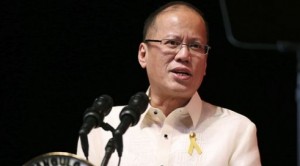Aquino wanted to avenge pa’s murder
NEWTON, Massachusetts—An eye for an eye.
President Aquino on Sunday admitted that he had thought of exacting revenge on the dictator Ferdinand Marcos after his father, former Sen. Benigno “Ninoy” Aquino Jr., was assassinated on his return to Manila on Aug. 21, 1983, after three years of self-exile in the United States.
“As the only son, I felt an overwhelming urge to exact an eye for an eye. Mr. Marcos and his ilk were like rabid dogs who had lost all reason. There was no longer any potential for dialogue; the only solution when confronted by a rabid dog is to put it down,” the President told nearly 500 people at Robsham Theater in Boston College.
“I knew that he was a formidable foe, but regardless of this, in those moments, all I wanted was to do to Mr. Marcos as he had done unto us,” said Aquino, who arrived in Boston on Saturday for a four-day personal and working visit to the United States following a trip to Spain, Belgium, France and Germany.
But there was a sober voice that calmed the President’s anger.
President Aquino said then Consul Takeo Iguchi, who was tasked by a senior Japanese politician to assist the family upon hearing of Ninoy’s death, told him: “Your people will be looking up to your mother and yourself.”
“And it was there that the idea began to take root, that you cannot make decisions just for yourself,” Aquino said.
Marcos had Ninoy Aquino, the leading opposition figure, jailed for nearly eight years after the declaration of martial law in 1972. The elder Aquino was allowed to leave for the United States for a heart surgery, but he decided to remain in exile there.
President Aquino himself noted “fortune’s way of showing its sense of irony.” He is back in Boston for the first time in three decades, speaking at the school and before friends and supporters, “42 years to the date that appears on Mr. Ferdinand Marcos’ signed declaration of martial law.”
“Following that declaration, my father, who appeared on top of the (communist guerrilla) order of battle, would be a political prisoner for seven years and seven months,” Aquino said.
The assassination of Ninoy Aquino has largely been blamed on Marcos, although it has not been proven in court.
Dialogue with dictator
Ninoy’s death sparked a national outrage that culminated in the military-backed Edsa People Power Revolution in 1986 that ousted Marcos and swept Ninoy’s widow, Cory, to the presidency.
The President’s father himself had once before quelled his son’s belief that the only way to end the Marcos dictatorship was through an uprising.
In a conversation with his father before he left for the Philippines, President Aquino recalled asking him: “Why entrust your fate to someone who has never done us any kindness? Why put your life in his hands?”
“To my mind, the most effective way of overthrowing a dictatorship was through a violent uprising,” the President said. But his father replied, “There are no victors in a civil war.”
“Even after all the injustice he had suffered at the hands of the dictator, Dad still hoped to have a dialogue with Marcos; he hoped that Mr. Marcos would be curious enough to listen to him,” Aquino said.
He recalled the brutality of the Marcos regime.
“Accountable to no one but themselves, the dictator, his wife, and their cronies turned the public treasury into their private purse. Checks and balances in government were replaced by the dictator being the sole judge, jury and executioner, giving his regime total impunity to abduct, torture, jail and kill its critics,” Aquino said.
He also remembered how under martial law, curfew was imposed, travel abroad required official permission, and “there was no such thing as freedom of speech or freedom of assembly.”
The country was besieged by the communist insurgency, the Moro secessionists, and, Aquino noted, even the moderate center had started the “Light a Fire” movement and the April 6 Liberation Movement that committed random arson and bombings around Metro Manila.
Avoiding civil war
The President said that “the country was in a dangerous place.”
“Dad knew that Mr. Marcos was surrounded by sycophants; human nature being what it is, no one would willingly give the dictator bad news. They would sugarcoat the situation, hoping to stay in Mr. Marcos’ good graces,” he said.
President Aquino said his father believed that someone had to tell Marcos the bad news.
His father believed that if Marcos listened, “there would be a way to avert a civil war whose end no one could foresee.”
“Dad decided to return home,” the President said.
Malacañang on Sunday said the President remained firm in his decision not to allow Marcos to be buried at Libingan ng mga Bayani. His mother, the late President Corazon Aquino, also barred the return of Marcos’ remains after he died in 1989 while in exile in Hawaii.
Then President Fidel Ramos allowed the repatriation of Marcos’ body in 1993 but not an interment at the heroes’ cemetery.
Marcos’ family said it was the dictator’s wish to be buried at Libingan ng mga Bayani. While waiting for the government to decide on their request, the Marcoses preserved their patriarch’s body and kept it in a crypt in the late dictator’s hometown of Batac, Ilocos Norte.
Originally posted: 7:09 am | Monday, September 22nd, 2014
RELATED STORIES
In Boston, Aquino walks down memory lane















